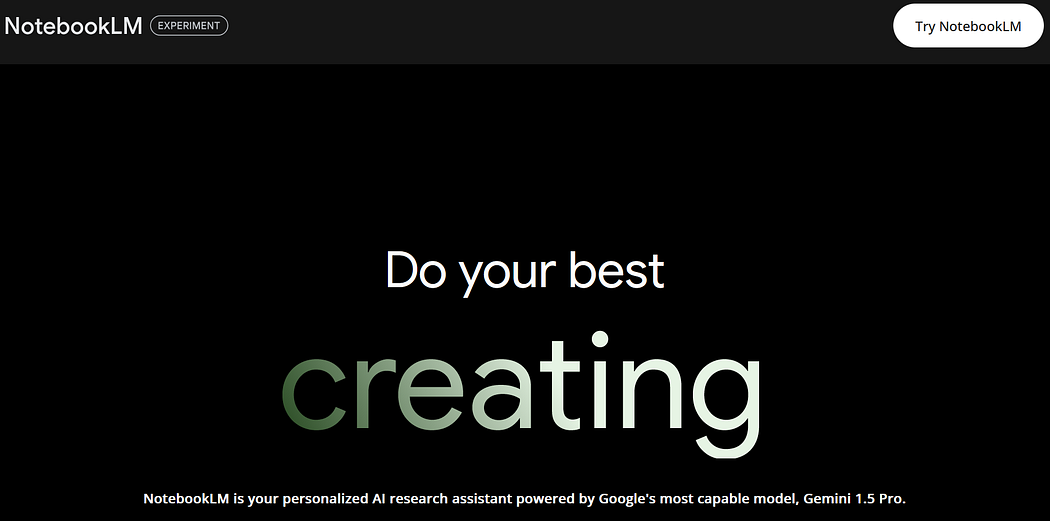Managing AI anxiety: a case study with NotebookLM

A promising young programmer recently told me he was thinking about quitting his software development career due to the overwhelming influence of LLMs. While this may be an extreme reaction, AI anxiety is a common concern among professionals from programmers to writers and analysts. To some extent it affects us all, what with every major development in LLMs being accompanied by headlines such as AI is already better than you at [insert your job here].
The best cure for this anxiety is to personally experience the capabilities of an LLM by using it to accomplish some task. However it is important to select a problem that you understand thoroughly, and the answer to which cannot be found online ideally something you have been personally working on for a few days (or even better, years). We ascribe too much power to AI when we lack the expertise to evaluate its outputs ourselves and are captivated by the fluency of the answers. Or when we are unable to tell the difference between memory and intelligence.
An Experiment with NotebookLM

Googles NotebookLM, an AI-powered research assistant for summarization and note-taking, has recently added an audio overview feature that converts uploaded content into a two-person podcast episode. This is a powerful UI/UX idea from a pedagogical standpoint, because many individuals prefer to learn from engaging conversations rather than static text. But how well does the conversation represent the underlying content? Many online demos, and the audio overview of NotebookLM itself, seem quite impressive, but these are topics that I dont understand well enough to evaluate. So I tried experimenting with a recent Inscripta AI article that we wrote, titled Unlocking the secret to effective enterprise data curation and QAbots. My observations are as follows.
Note: I generated two podcast episodes from the same article for a more comprehensive analysis. The observations below are based on both versions. Links to the full episodes: version 1 | version 2
The Good: The tool captures the central concern of the article very well. I would agree with this initial framing of the discussion:
We are diving into the world of enterprise AI, and how to unlock the power of AI for your business There’s this huge gap between, you know, the flashy AI demos and the practical applications businesses actually need right out-of-the-box AI solutions. They often miss the mark when it comes to those complex industry specific challenges
I found the use of analogies to illustrate this point particularly impressive:
But a generic LLM cant just magically connect the dots and hand them a solution, can it? Its like asking a chef to bake a cake with a fully stocked pantry, but no recipe.
An LLM is like a powerful engine, but without the right transmission and steering wheel, it cant get you where you need to go. So we need to give that powerful AI engine a specific direction, a road map tailored to a businesses unique needs.
The tool appropriately emphasizes problem formulation as a crucial aspect, which (in retrospect) I feel the article understates.
There are a few phrases and constructions that the podcast episodes use that enhance the urgency of certain points, beyond what was in the original article:
Its about building AI thats as unique as your business.
Because lets be honest, nobody wants to scrap their entire system and start from scratch every time a new technology comes along, right?
When we talk about workflows in the context of AI, were really talking about integration.
The last one is especially impressive, because AI Integration. Fast-tracked is Inscripta AI’s tagline but that is not stated in the article.
The Bad: As with humans (particularly in interview settings!), the tools biggest strength is also its greatest weakness: it over-extrapolates.
Its about finding those areas where AI can supercharge what humans are already doing, not trying to replace them altogether.
This is a point the source article does not touch upon. While the proposition may be true, it falls outside the scope of the article. The tool also suggests that building a dream team for AI is one of the recommendations of the article, which again is a step too far.
Similarly, it extrapolates implementation details that could be misleading, such as training on specific machines [equipment] or drawing inferences based on risk assessment models.
The tool also skips many specific (and boring?) ideas on document and query understanding that are listed in the article. Does the tools objective function privilege interestingness over faithfulness?
OK, I have to admit, when I hear PDF parsing, it doesn’t exactly set my world on fire.
The Wobbly: The absence of any hint of ugliness or gross contradictions in either version of the podcast episode is a testament to the sophistication of current AI models and to how well NotebookLM understands the podcast format. However, there are however a few minor irritants that could be easily addressed:
- The two speakers had different voices but lacked distinct identities, blurring the lines between them.
- The discussion failed to engage with the images or captions in the original article, raising questions about whether they were processed at all.
- The two generated podcast episodes exhibited markedly different focuses, both of which made sense, but this should be controllable.
- I found the use of enthusiastic phrases such as now that is cool, ‘fascinating and you hit the nail on the head to be rather excessive. While calibrating this based on user preference should be fairly straightforward, the incoherence of the discourse in some instances was disconcerting. (Who responds to couldn’t have said it better myself with well said?)
B: And not letting the excitement, the hype, outpace the reality.
A: Couldn’t have said it better myself.
B: Well said.
A: A huge thank you to you.
B: Such great insights.
A: I’ve learned so much.
B: This has been fantastic.
A: Its been my pleasure.
B: I really enjoyed it.
- Finally, there were a couple of hilarious technical glitches. One episode took a commercial break and then immediately returned to the conversation without any transition. Towards the end of one of the episodes, the tool looped through a 2-minute exchange twice as if on auto-complete.
Conclusion: Extrapolation is both an LLM feature and a bug
NotebookLMs audio overview feature is a valuable tool for quickly grasping the basic gist and key points of an article. However, its important to remember that it does occasionally over-extrapolate or introduce irrelevant background information. To gain a comprehensive understanding of the finer nuances, reading the original source remains essential.
For authors, listening to your writing transformed into a podcast can be an insightful experience, and a great way to review your work. Sometimes the tools extrapolations also provide ideas and analogies that you may not have yourself thought of. While NotebookLMs audio overview is not a substitute for careful reading, it can be a valuable addition to your learning and analysis toolkit. Moreover it is quite entertaining, which may be a necessity for education today.
More generally, examining the ways in which LLM-based tools falter, or hit a wall, can give us a sense of the mechanisms they use and their limitations. This can not only alleviate AI anxiety, but also help us use these tools in a complementary manner.
Meta-meta: Audio overview of this article!
Get in Touch
To schedule a demo and discuss how we can customize our solutions to meet your requirements, drop us a line at contact@inscripta.ai.